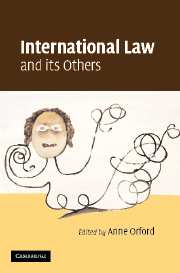Book contents
- Frontmatter
- Contents
- Acknowledgments
- Notes on the contributors
- 1 A jurisprudence of the limit
- PART I Sovereignty otherwise
- PART II Human rights and other values
- PART III The relation to the other
- 10 Completing civilization: Creole consciousness and international law in nineteenth-century Latin America
- 11 From ‘savages’ to ‘unlawful combatants’: a postcolonial look at international humanitarian law's ‘other’
- 12 Lost in translation: re-scripting the sexed subjects of international human rights law
- 13 Flesh made law: the economics of female genital mutilation legislation
- PART IV History's other actors
- Index
12 - Lost in translation: re-scripting the sexed subjects of international human rights law
Published online by Cambridge University Press: 20 July 2009
- Frontmatter
- Contents
- Acknowledgments
- Notes on the contributors
- 1 A jurisprudence of the limit
- PART I Sovereignty otherwise
- PART II Human rights and other values
- PART III The relation to the other
- 10 Completing civilization: Creole consciousness and international law in nineteenth-century Latin America
- 11 From ‘savages’ to ‘unlawful combatants’: a postcolonial look at international humanitarian law's ‘other’
- 12 Lost in translation: re-scripting the sexed subjects of international human rights law
- 13 Flesh made law: the economics of female genital mutilation legislation
- PART IV History's other actors
- Index
Summary
International human rights law ‘sexes’ its subjects, (re)producing unequal relations of gender power, but at the same time providing important opportunities for contestation and change; at least that is the hope that has sustained feminist human rights advocacy. Around the world, women's human rights campaigners have engaged assiduously with the discourse as activists, victims, policy-makers and lawyers, pushing against its masculinist and imperial underpinnings in their efforts to glimpse its emancipatory potential. This engagement has revealed that, through a variety of techniques and historical residues, women are systematically marginalized by the masculine standards and conceptions of the regime and therefore not constituted as fully human for the purposes of guaranteeing their enjoyment of human rights. The allegedly neutral universal subject of human rights law also reproduces other hierarchies, including those of race, culture, nation, socio-economic status and sexuality, which intersect with constructions of gender to produce subjects that bear the markings of complex histories of subjugation and resistance. While being attentive to these intersections, and the part that feminist human rights advocacy has played in reproducing other hierarchies, my goal in this chapter is to focus on the lineage of the dualistic and hierarchical production of sexed subjectivities in human rights discourse in order to examine how the exclusionary effects of a discourse that makes the highest claims to inclusivity have been legitimated.
- Type
- Chapter
- Information
- International Law and its Others , pp. 318 - 356Publisher: Cambridge University PressPrint publication year: 2006
- 41
- Cited by



